Is Chai Tea Latte Good for You
Drinking a chai tea latte can be beneficial for your health. It contains a blend of spices and tea that offer various advantages.
Antioxidants
Chai tea latte is made from black tea, which is rich in antioxidants. These can help protect your cells from damage caused by free radicals.
Anti-inflammatory Properties
Several spices in chai, such as ginger and cinnamon, have anti-inflammatory effects. They may help reduce inflammation in your body.
Bestsellers
Digestive Health
Ginger and cardamom are known to promote digestive health. They can aid in digestion and reduce nausea and bloating.
Immune Support
Cloves and cinnamon in chai have antibacterial properties. They can support your immune system by fighting off infections.
Heart Health
Cinnamon is linked to improved heart health. It can help lower blood pressure and cholesterol levels.
Blood Sugar Control
Cinnamon and ginger may help regulate blood sugar levels. This can be especially beneficial for individuals managing diabetes.
Mental Alertness
The caffeine in black tea can improve mental alertness. It can help you stay focused and attentive.
Mood Enhancement
Drinking a warm chai tea latte can provide comfort and potentially improve your mood. The spices and warmth can have a calming effect.
Nutritional Components
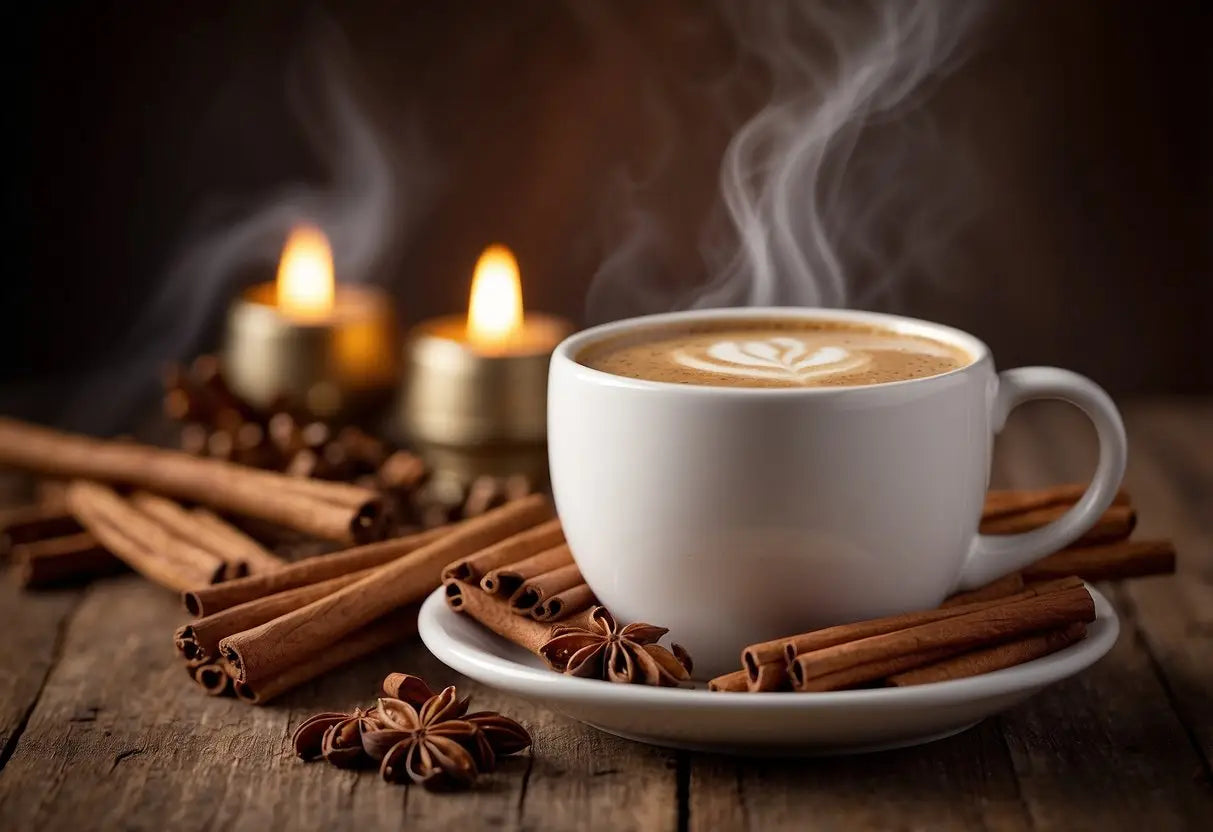
Chai tea lattes contain several intriguing nutritional elements, ranging from an array of spices to essential macros like calories, proteins, and fats. These components contribute to the unique flavor and potential health benefits of the beverage.
Spices in Chai Tea Latte
Chai tea lattes are typically crafted with a blend of spices such as cinnamon, cardamom, ginger, cloves, and black pepper. These spices offer more than just taste; they have various health-promoting properties.
- Cinnamon: Known for its anti-inflammatory and antioxidant properties.
- Cardamom: Contains compounds that may aid digestion and support oral health.
- Ginger: Can help with nausea relief and has anti-inflammatory effects.
- Cloves: High in antioxidants and may aid liver health.
- Black Pepper: Enhances nutrient absorption and possesses antimicrobial properties.
Including these spices in your chai tea latte can add to the potential health benefits of the drink.
Calories and Macros
A typical chai tea latte contains calories primarily derived from milk and sweeteners. These can vary based on the type of milk (such as whole, skim, or plant-based) and the amount of sugar added.
Nutritional Breakdown (Approximate values for a 12 oz serving):
Lao Ban Zhang
- Calories: 200-300, depending on milk and sugar content.
- Protein: 5-10 grams from the milk.
- Fats: 3-8 grams, influenced by the type of milk.
- Carbohydrates: 30-45 grams, mainly from sweeteners and milk.
Consider using low-fat or plant-based milk and reducing sugar to make your chai tea latte healthier.
Potential Risks and Considerations
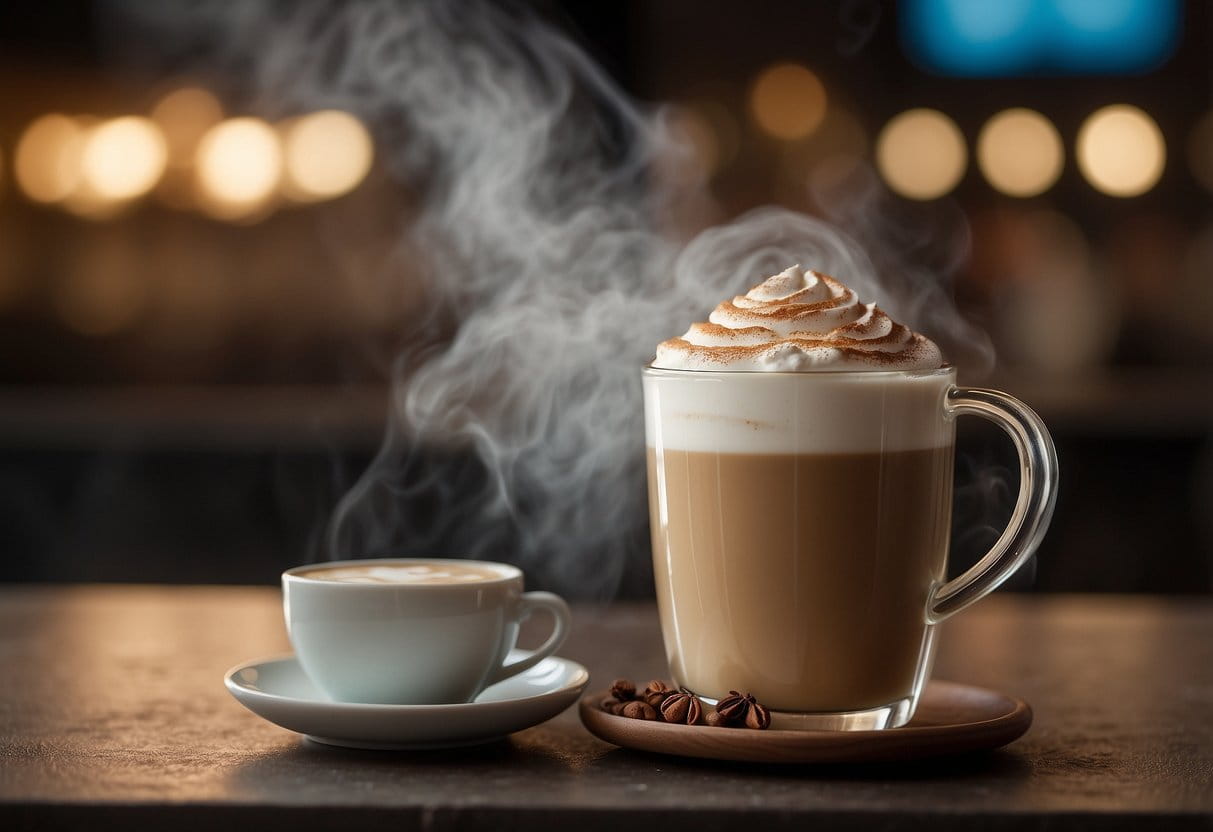
While chai tea lattes offer a rich, flavorful experience, it is essential to be aware of potential risks. These include the caffeine content, the impact of sugar and sweeteners, and the variations in dairy and non-dairy options.
Caffeine Content
Chai tea lattes typically contain black tea, which has caffeine. The amount of caffeine can range from 20 to 60 milligrams per cup. This is less than coffee but still deserves attention, especially if you are sensitive to caffeine or consume multiple servings daily.
Consuming excessive caffeine can lead to issues such as insomnia, jitteriness, and increased heart rate. If you are pregnant, nursing, or have certain health conditions, consider consulting with your healthcare provider about your caffeine intake.
Sugar and Sweeteners
Chai tea lattes are often sweetened with sugar or syrups, leading to a high-calorie count. A regular-sized serving can contain between 20 to 50 grams of sugar, which is significant for those monitoring their sugar intake.
Excessive sugar consumption can contribute to weight gain, dental problems, and the risk of developing type 2 diabetes. Opt for unsweetened versions or use natural sweeteners in moderation to manage your sugar intake more effectively.
Dairy and Non-Dairy Variants
Chai tea lattes are traditionally made with milk, but non-dairy alternatives are increasingly popular. Dairy milk contains essential nutrients, yet some individuals may experience lactose intolerance or allergies.
Non-dairy milks, such as almond, soy, or oat milk, vary in nutritional content and may include added sugars or thickeners. Choose your milk variant according to dietary needs and taste preferences, and check labels for added ingredients that could impact your health goals.
Preparation Methods Impact

The way you prepare a chai tea latte significantly affects its nutritional value and taste. This includes differences between traditional and commercial preparations as well as options for making it at home.
Traditional vs. Commercial Preparations
Traditional chai tea lattes often use specific blends of spices like cardamom, cinnamon, and ginger, brewed with black tea and milk. They are typically sweetened with natural sweeteners like honey.
Commercial preparations, on the other hand, may contain added sugars, preservatives, and artificial flavors. This can impact the health benefits and caloric content. For example, a commercial chai tea latte from a cafe often has significantly more sugar than one prepared traditionally.
Nutritional Comparison:
| Method | Sugar Content | Caloric Content | Additives |
|---|---|---|---|
| Traditional | Low | Moderate | Rare |
| Commercial | High | High | Common |
Homemade Recipe Options
Preparing a chai tea latte at home allows you to control the ingredients and nutritional content. You can choose the type and amount of sweetener, spice level, and milk variety (dairy or non-dairy).
To make a simple homemade chai tea latte, start by brewing strong black tea and add spices like cardamom, cinnamon, and ginger. Sweeten with honey or maple syrup if desired and mix with heated milk.
Basic Homemade Recipe:
- Brew 1 cup of strong black tea.
- Add 1/2 tsp ground cardamom, 1/2 tsp ground cinnamon, and 1/4 tsp ground ginger.
- Sweeten with 1-2 tsp honey or maple syrup (optional).
- Mix with 1 cup heated milk (dairy or non-dairy).
Benefits:
- Control over ingredients
- No artificial additives
- Customizable to taste and dietary needs
Dietary Alignments
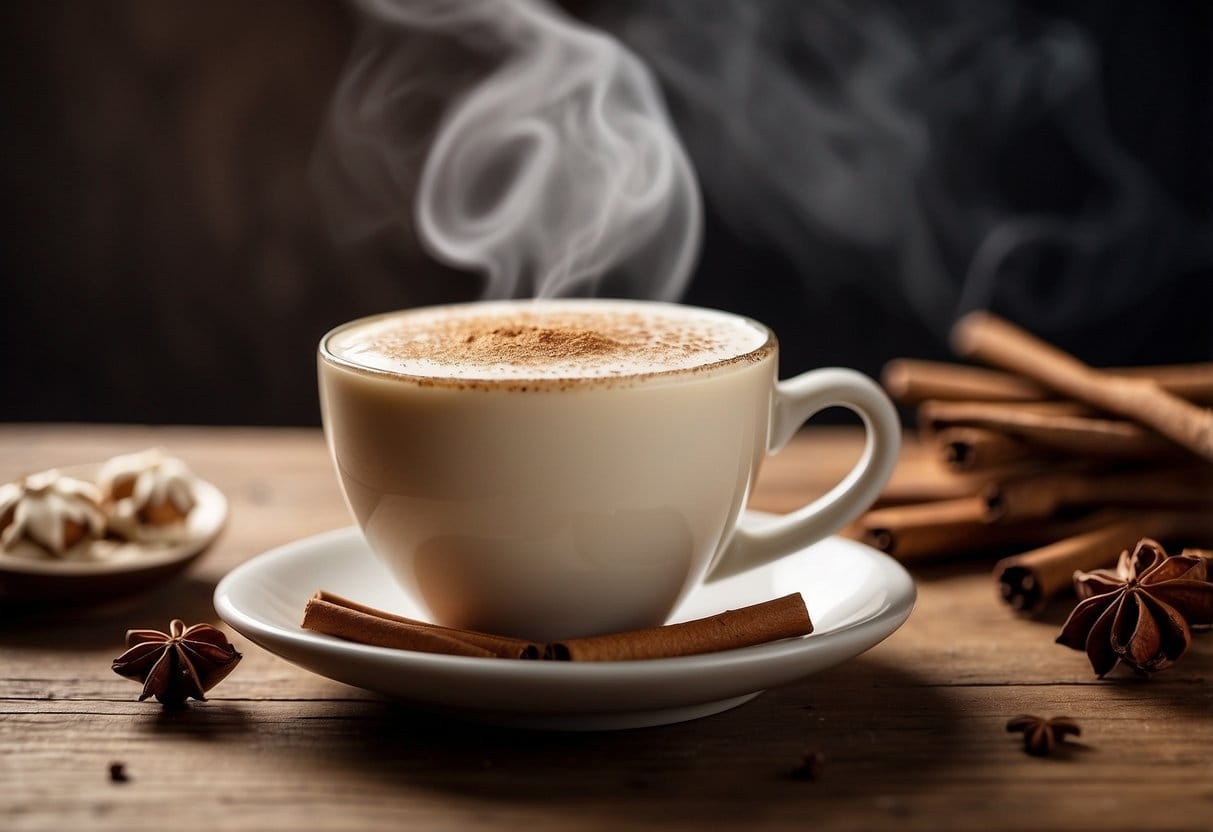
Chai tea lattes can be enjoyed by many people, even those with specific dietary needs. This includes adaptations for vegan, lactose-free, gluten-free, and allergy considerations.
Vegan and Lactose-Free Adaptations
Chai tea lattes can be made vegan and lactose-free with easy substitutions. Replace regular milk with plant-based alternatives like almond, soy, oat, or coconut milk. These substitutes also suit those who are lactose intolerant.
Ensure the chai concentrate you use is free from honey or animal-derived ingredients. Brands like Tazo or Oregon Chai offer vegan-certified options. Sweeteners such as agave or maple syrup work well to keep the beverage vegan-friendly.
Gluten-Free and Allergy Considerations
Most chai tea blends are naturally gluten-free, as they consist primarily of tea leaves and spices. However, double-checking for possible cross-contamination is crucial, especially with pre-made mixes. Brands like Numi and Stash Tea provide gluten-free guarantees.
For those with other allergies, scrutinize ingredient lists for potential allergens. Some spice blends may contain traces of nuts or other allergens, so opting for certified allergen-free brands ensures a safer choice.
Consumption Recommendations
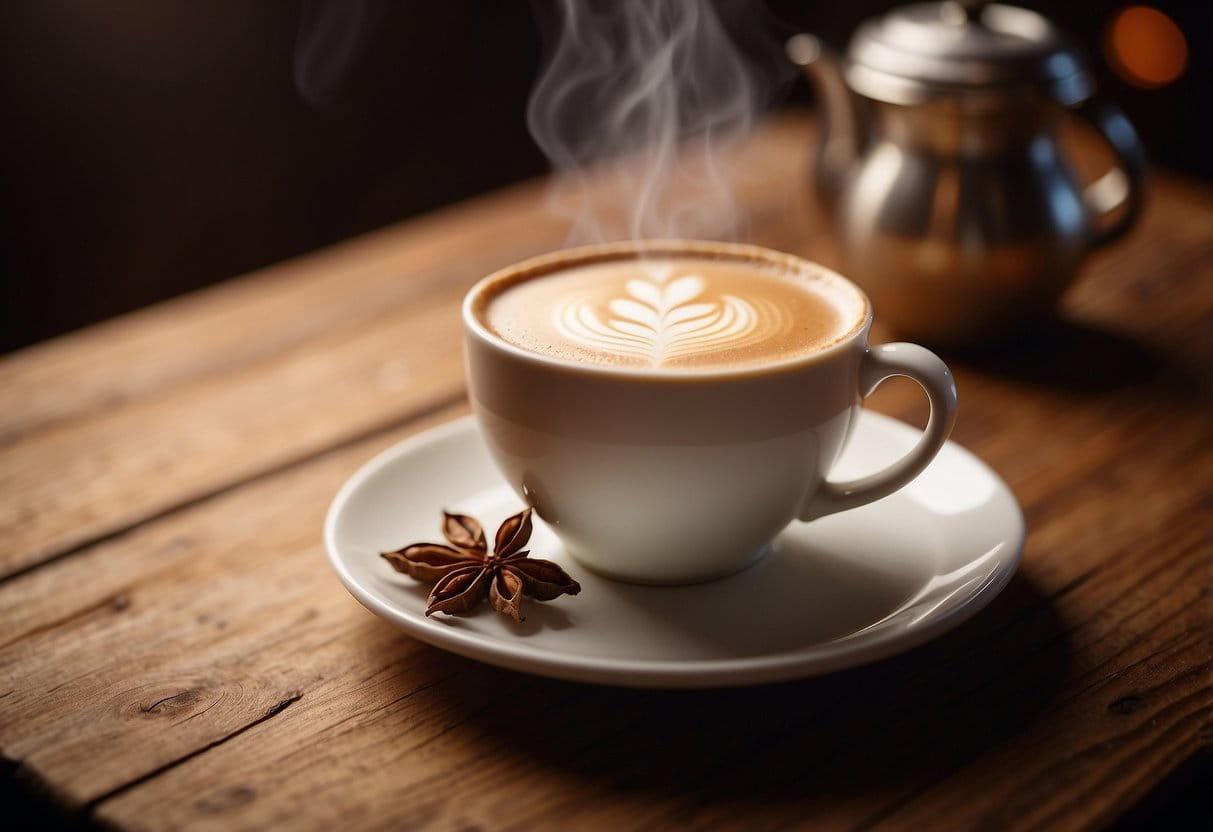
To enjoy a chai tea latte in a healthy way, moderation is key. Having one to two servings per day can be part of a balanced diet.
Opt for unsweetened or lightly sweetened versions. Using too much sugar can add unnecessary calories and reduce the health benefits.
Consider choosing non-dairy milk like almond, oat, or soy milk. These options can be lower in calories and fat compared to whole milk.
Monitor your caffeine intake. Chai tea contains caffeine, so you should be mindful of your total daily caffeine consumption to avoid potential adverse effects.
You can also make your own chai tea latte at home. This allows you to control ingredient quality and sugar levels more easily.
If you have food allergies, especially to spices or certain types of milk, you should be cautious and check ingredient labels carefully.
Here's a simple recipe you might like:
- Tea: Brew a strong cup of black tea.
- Spices: Add cinnamon, cardamom, ginger, and cloves.
- Milk: Mix with a non-dairy milk of your choice.
- Sweetener: Sweeten lightly with honey or maple syrup if desired.
Making your own chai tea latte allows for customization to meet your dietary needs and preferences.
Enjoy your chai tea latte as part of a varied diet for maximum benefits.
Cultural Significance of Chai Tea
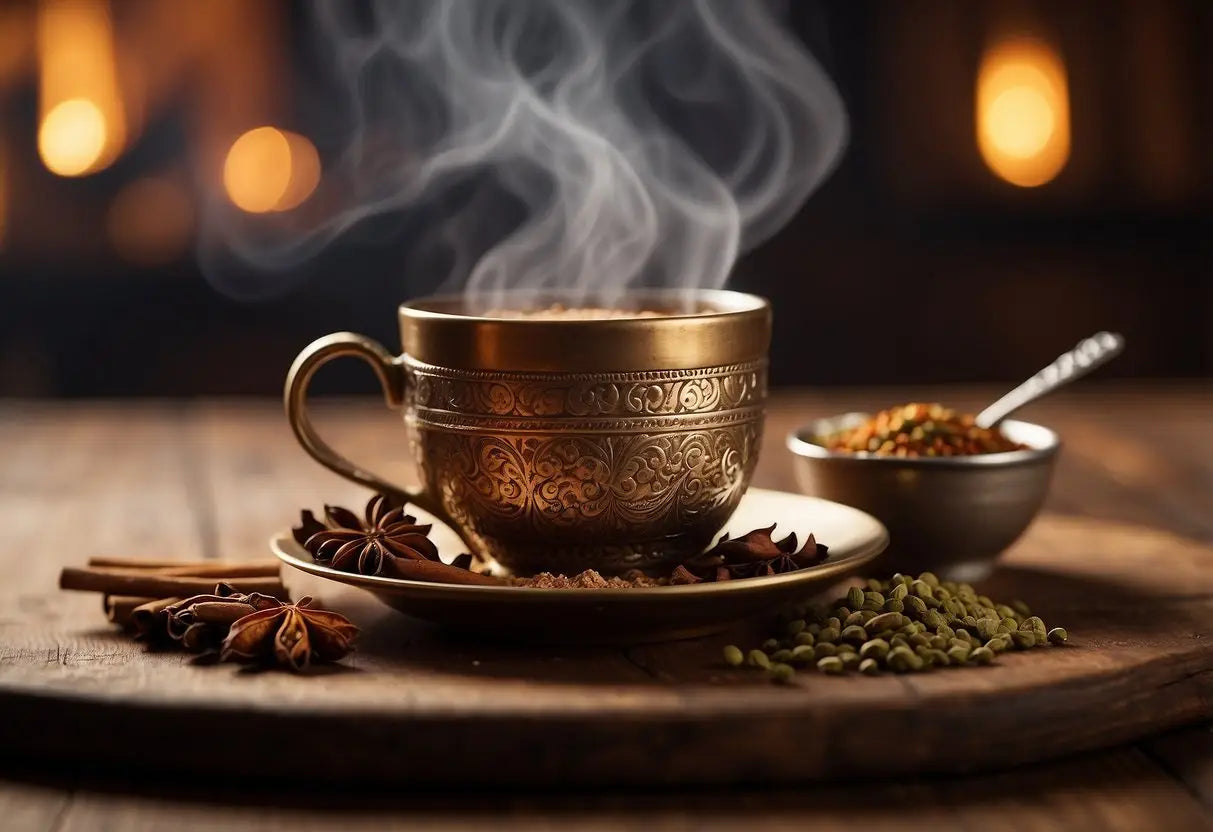
Chai tea, known as "masala chai" in India, boasts a rich cultural history. Its roots can be traced back to ancient Ayurvedic traditions, where it was valued for its medicinal properties.
In India, chai is more than just a beverage; it is a social ritual. Chai stalls, or "chaiwalas", are common in busy markets and streets, serving as community gathering spots.
The traditional preparation involves brewing black tea with a mix of spices like cardamom, ginger, and cloves. Each family or region often has its unique recipe, reflecting local flavors and customs.
Chai plays a role in daily life and special occasions. It is offered to guests as a sign of hospitality. It is also enjoyed during business meetings and festivals.
Beyond India, chai has gained global popularity. Many people around the world now savor its aromatic blend. In Western cultures, it has been adapted into the popular chai tea latte.
Chai's cultural influence is evident in literature, movies, and art. It symbolizes warmth, connectivity, and tradition, making it an enduring and cherished drink.
← Older post Newer post →











